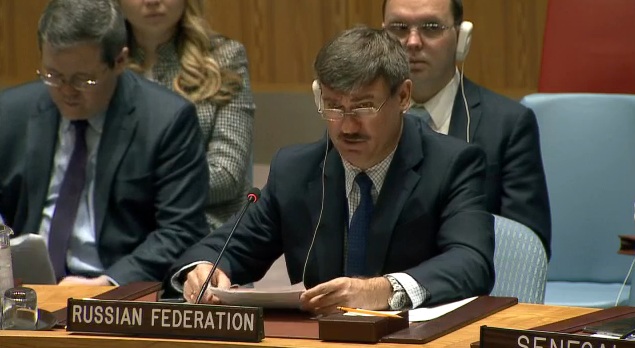Statement by Mr. Petr Iliichev, Chargé d'Affaires, at the Security Council on the question concerning Haiti
The Russian delegation voted in favour of resolution 2350 (2017) because of the importance of the role that the United Nations Stabilization Mission in Haiti plays in stabilizing the situation in that country, and because there is a need to continue extending assistance to the Government of Haiti. At the same time, we would like to offer some comments on the content of the resolution and the working methods of the Council.
We note that there is a discrepancy, on the one hand, between the documents submitted and the nature of our recent discussions over the situation in Haiti and, on the other, the statements made by the author of the resolution and those who supported it. It will be recalled that on 6 April, the Council came together in order to assess the effectiveness of United Nations peacekeeping operations (see S/PV.7918). Over the course of that meeting, the United States delegation, which initiated the meeting, stated that there was a need to go back to basics in peacekeeping and make sure that we prevent an uncontrolled bloating of mandates. The delegations and the Secretariat said that it was important to make sure that applicable mandates were made understandable, clear and attainable. However, those ideas are not reflected in the documents submitted. The mandate of the mission is not clear. On one hand, the Mission is to carry out the monitoring of human rights either by itself or by helping the Government to do so. On the other hand, it is stated that the decision was made by the Council in line with Chapter VII of the Charter of the United Nations, which implies the use of force. We do not understand how, in principle, this could be implemented in practice.
In the course of working on the draft resolution, we heard objections. People said that the previous mission also worked on the basis of Chapter VII, but let us take a careful look. Its use had been very clearly limited exclusively to issues having to do with maintaining security. So, the question arises: how did the situation in the country change? Is it that the penholders and those who supported the resolution within the Council are so convinced that, against the backdrop of a gneral improvement of the situation in Haiti, the situation violations of human rights has, contrarily, become a threat to international peace and security? That would be the only case in which this situation could become a subject for consideration for the Security Council.
Let me recall that the Blue Helmets are in Haiti because of issues having nothing to do with human rights. The same logic also applies to the Secretariat’s good offices. A question here is: to what extent are they good if this is something that falls under Chapter 7 of the Charter? What is most surprising is that these requests are being made against a background of basic stabilization in Haiti, which is exactly what allowed us to consider the drawdown and changing the format of the presence of the United Nations in the country. Literally two days ago, on 11 April (see S/PV.7920), we discussed the Secretary-General’s report on the situation in Haiti (S/2017/223). Basically all those who spoke then, including the Special Representative of the SecretaryGeneral, Ms. Sandra Honoré and most members of the Council, noted that a peaceful transfer of power had taken place and that there was an improvement in the security situation. They also noted that it was exactly these positive developments that enabled us to consider the issue of reviewing the mandate of the mission.
During the discussion of the draft statement, we also heard that a robust mandate was necessary to supposedly maintain the levers of influence over the Government. We are not convinced that in this situation we need to be talking about exerting influence or pressure, especially since we are talking about the Mission’s success, which will enable us to close it in six months. We think that in this context what we need to be stressing is interaction and cooperation with the host country, especially since there is a clear prospect that the situation will normalize. Unfortunately, we cannot confidently say that the text submitted was the outcome of the work done by the Group of Fiends of Haiti, and not only because the version adopted differs from the version agreed in that format, but also because of the criticism made by members of the Group about the decision-making process within that informal body.
